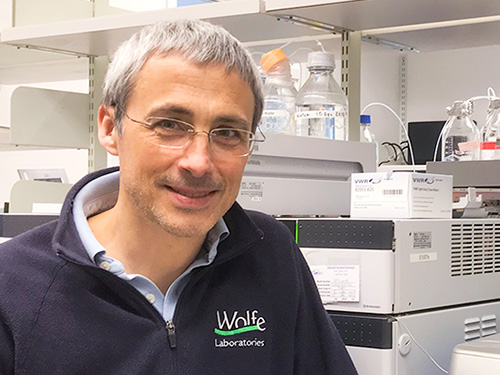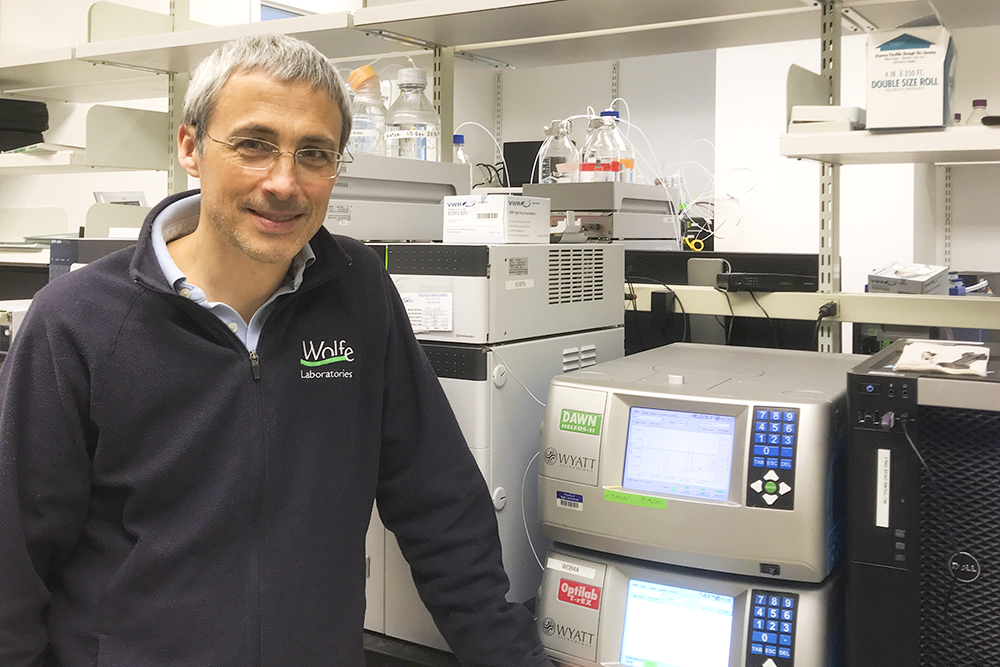Featured Customer: Carlo Zambonelli, Ph.D.

We spoke with Dr. Carlo Zambonelli, to get to the bottom of his ongoing relationship with Wyatt Technology.
Carlo, can you please tell us about your background: where you grew up, studied and the field you chose?
I grew up in Reggio Emilia, in Northern Italy, and I started my education in one of the elementary schools first adopting the innovative Reggio Emilia Approach. Fast forward several years, I was a Biology student at Parma University where I obtained a Masters degree in Biochemistry with a thesis on the cooperative regulation of oxygen binding to hemoglobin. I continued my education at Milano University where I obtained a PhD in Molecular and Cellular Biology, although my thesis was really about applied enzymology.
What led you to choose that direction? What are the challenges that excite you?
I chose Parma University because of the strong program in Ecology—which is what I meant to study—but during my second and third years I discovered physical chemistry, molecular biology and biochemistry and I fell in love with the elegance and sophistication of proteins. Since then I have developed and cultivated a passion for structure/function relationships in proteins.
Currently, what really excites me is the application of biophysical techniques to the characterization of biological entities, a category in which I include nucleic acids, lipid nanoparticles, polysaccharides and their combinations.
What does your current position entail? How does it tie into your previous experience, and where is it going?
I joined Wolfe Laboratories in November 2017 as an Associate Director for Pharmaceutical Development; I am mostly involved in the characterization and development of multiple gene therapy modalities, both as a scientific leader and project manager, and as a scientific advisor. I am also spearheading an initiative to increase efficiency in the lab and further expand our analytical capabilities, to enable Wolfe Labs to strengthen its role as a primary partner for many pharma and biotech companies.
Gene therapy is having a very strong period, with new platforms being introduced every year and a constantly evolving need for addressing complex analytical problems using biophysical techniques, which merges really well with my passion for solving biological puzzles. On a good day I feel like a kid in the candy store!
In what context did you first learn about light scattering and Wyatt instruments?
My first hands-on experience with dynamic light scattering (DLS) and quadruple-detection size exclusion chromatography (SEC-UV-MALS with DAWN® MALS, Optilab® dRI and ViscoStar® intrinsic viscosity detectors) dates back to 2009 when I started working at Novartis Vaccines, my first industry job. I was fortunate enough to have a good amount of spare time in the lab, which I used to go through all the excellent tutorials provided with ASTRA®.
How have MALS and DLS contributed to your research and development studies?
When at Novartis Vaccines I was working on the development and characterization of HIV-1 gp140 Env trimers. This glycoprotein is actually a mixture of monomers, dimers and trimers in variable ratio, depending on which one, of the many serotypes we worked with, I was analyzing. SEC-MALS was an important tool to assess the stability of the trimers; since trimeric gp140 is known to contain unique protective epitopes, selecting stable trimers was an important first step towards the development of better vaccine candidates.
Later in my career, at Novartis Vaccines (now GSK) in Siena, Italy, my team used SEC-UV-dRI-MALS in conjunction with LC-MS to characterize the detailed topology of glycoconjugate vaccines. This was a very complex and long project that I still consider one of the main technical achievements in my career so far. Did I mention how fun it has been?
Any personal anecdotes that would help illuminate your career or outlook?
My career path has been very convoluted and apparently with little logic and no design; at times (three? four? maybe more!) I found myself at dead ends, and my scientific career could have ended at any of them. If it hasn’t, it’s only because I am passionate about characterizing proteins and solving complex problems, and at the end that's the only activity I’m really good at: I didn't have any other choice than to keep going! I have to say, each time I landed at a good spot.

"Year after year I keep coming back to Wyatt for the quality of their instruments, which are constantly evolving and offering new solutions, and for the unmatched scientific support the Wyatt team provides."
